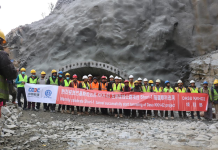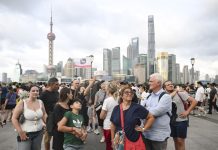BEIJING: In Brazil’s northern Amazonas state, 68-year-old Isabel Cezerio, a member of the Ticuna ethnic group, became the first indigenous person in her village to get CoronaVac, a COVID-19 vaccine, on January19.
On the same day, in another part of the world, Serbian Health Minister Zlatibor Loncar became the first person in his country to receive a Sinopharm’s COVID-19 vaccine. The vaccines Cezerio and Loncar received were both developed in China and have been proved to protect people against COVID-19 in a safe, effective and affordable way. “I am very grateful for the vaccine. Thank God I received it,” Cezerio said in her native language.
From Brazil to Turkey, from Indonesia to Bahrain, Chinese COVID-19 vaccines are joining the worldwide battle against the contagious virus. The evaluation of a vaccine requires many comprehensive indicators, of which safety, effectiveness, accessibility and affordability are the most important, said Zheng Zhongwei, of the National Health Commission.
So far, 12 foreign countries have granted market approval or emergency use for Chinese vaccines, one developed by Sinovac Biotech Ltd. and the other by Sinopharm’s bioscience subsidiary the China National Biotec Group (CNBG). Six Chinese vaccines have entered phase-3 clinical trials.
The Sinovac vaccine, CoronaVac, has an efficacy rate of 91.25 percent in clinical trials in Turkey and 65.3 percent in Indonesia. Clinical studies in Brazil suggested the vaccine was 100 percent effective in preventing severe cases, 78 percent effective in preventing mild cases requiring medical treatment, and had a general efficacy rate of 50.38 percent.
“It’s normal to get varying results in different countries, and the clinical trials are influenced by multiple factors,” said Yin Weidong, Sinovac chairman and CEO. He noted that all the participants in the phase-3 clinical trials in Brazil were medical workers in high-risk environments who might be attacked by the virus many times.
The United Arab Emirates, which announced the official registration of the CNBG vaccine last December, said the interim analysis of the phase-3 trials shows the vaccine provides 86 percent efficacy against COVID-19, the seroconversion rate of neutralizing antibodies reaches 99 percent and it is 100 percent effective in preventing severe cases.In China, more than 15 million doses of domestically-developed vaccines had been administered as of January 20.
CNBG Chairman Yang Xiaoming told media the side effects were mainly limited to pain at the injection site, headache, muscle pain and fever. The vaccines are exported by air in temperature-controlled boxes. Thermometric indicators monitor and record the entire process to ensure the safety and effectiveness of the vaccines.
“Recipients can use designated software to read the recorded data to verify that the vaccine has indeed been kept at between 2 and 8 degrees Celsius,” Yin Weidong said. China’s vaccine producers have been required to plan and increase production capacity and contribute to vaccine accessibility and affordability in developing countries.
Yin said Sinovac would export semi-finished jabs to some countries and help build local filling and packaging lines in importing countries to improve production capacity and efficiency.
Serbian health authorities said they “assessed the necessary documentation and scientific evidence in a highly professional and thorough manner according to all European Union and World Health Organization (WHO) standards, which confirmed the quality, efficiency, and above all the safety of the Chinese vaccine.”
– The Daily Mail-Beijing Review News exchange item






